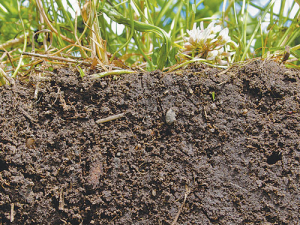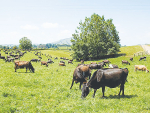One teaspoon of soil contains more living organisms than there are people in the world. Without this biological diversity there would be no life on earth.
In addition to providing habitat for billions of organisms, soil acts as a water filter and growing medium. It contributes to biodiversity, solid waste treatment, acts as a filter for wastewater and supports agriculture.
Unlocking the secrets of this complex chemical, physical and biological powerhouse – a powerful source of ‘natural capital’ -- has had a huge impact on human life.
The transformation of this type of natural capital into resources that people value and use is generally called ecosystem services. It is a concept gaining more attention as we see environmental pressure increasingly applied to the health of resources, such as the soil we once took for granted.
Functional land management seeks to optimise the cropping and environmental returns from land. It focuses on soil functions related to agricultural land use: primary production, water purification and regulation, carbon cycling and storage, functional and intrinsic biodiversity and nutrient cycling.
Waikato Regional Council’s soil quality monitoring programme measures soil properties such as soil compaction, nutrient status, biological activity, soil carbon and organic matter at 150 sites. About 30 sites are sampled each year so it takes five years to get around all 150 sites. The sites covered include the major land uses and soil types within the region.
The results show a variety of trends, ranging from issues such as compaction and excessive nutrients to an improvement in some indicators such as macroporosity (a measure of the proportion of large pores in the soil that provide the air supply to roots).
The latter is most likely attributable to good land management practices by farmers.
Building on that good work, some areas still need improvement.
Good practices needed include optimum cultivation and avoiding over-grazing and heavy grazing under wet weather, both of which can damage the soil’s structure and lead to compaction.
Others include carefully matching fertiliser applications to suit soil and crop requirements, practicing appropriate use of pesticides and other agrochemicals, managing pasture to maintain complete soil cover and careful application of farm dairy effluent to avoid saturation and to optimise organic matter and nutrient status.
Minimising human-induced erosion and maintaining good soil quality are essential for maintaining soil ecosystem services such as nutrient and water buffering, productive capacity, assimilating waste and minimising impacts of sediment and other contaminants on water bodies.
Protecting sensitive areas on farms also benefits production. For example, wetlands improve water quality, regulate flooding, and protect coasts and fish habitat.
• Bala Tikkisetty is a sustainable agriculture advisor at Waikato Regional Council.


















